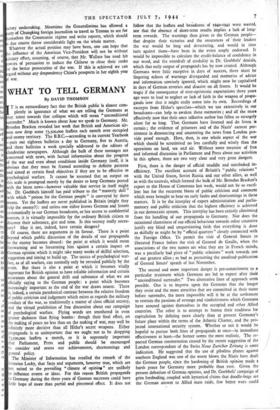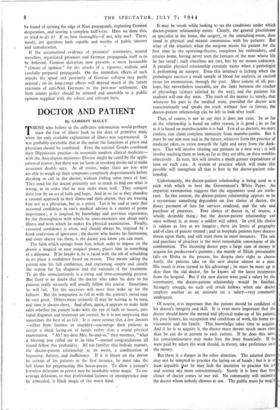WHAT TO TELL GERMANY
By DAVID THOMSON T is an extraordinary fact that the British public is almost com-
pletely in ignorance of what we are telling the Germans as hey totter towards that collapse which will mean "unconditional urrender." Much is known about how we speak to Germany. Mr. rendan Bracken revealed last week that British and American air- en now drop some 73,500,000 leaflets each month over occupied nd enemy territory. The B.B.C.—according to its current Yearbook
puts out eighteen bulletins a day to Germany, five to Austria, d three bulletins a week specially addressed to the editors of landestine newspapers. Although the bulk of these messages are oncerned with news, with factual information about the progress
the war and even about conditions inside Germany itself, it is bvious that they must be framed according to definite patterns nd aimed at certain fixed objectives if they are to be effective as sychological warfare. It cannot be assumed that an output on his scale is prompted merely by the desire to keep Germans posted ith the latest news—however valuable that service in itself might be. Dr. Goebbels himself has paid tribute to the " masterly skill " ith which "poison for the German people" is conveyed by these eans. Yet the leaflets are never published in Britain (might they help the enemy?): and unless one either knows German and listens systematically to our German broadcasts, or has access to confidential ources, it is virtually impossible for the ordinary British citizen to iscover their substance, gist and tone. Is this secrecy really neces- ary? May it not, indeed, have certain dangers?
Of course, there are arguments in its favour. There is a point eyond which public discussion of the details of our propaganda o the enemy becomes absurd : the point at which it would mean forewarning and so forearming him against a certain impact on
erman opinion which it might take many weeks of skilful selection, suggestion and timing to build up. The tactics of psychological war- are, as of all warfare, can normally only be revealed publicly by the event. But there is also a point at which it becomes vitally mportant for British opinion to have reliable information and certain assurances about the general drift and substance of what we are officially saying to the German people: a point which becomes increasingly important as the end of the war draws nearer. There is, indeed, a certain paradoxical contrast between the relative freedom of public criticism and judgement which exists as regards the military conduct of the war, so traditionally a matter of close official secrecy, and the virtual prohibition of free discussion about our campaign of psychological warfare. Flying words are smothered in even greater darkness than flying bombs: though their final effect, on the making of peace no less than on the making of war, may well be infinitely. more decisive than all Hitler's secret weapons. Either propaganda is so unimportant that we ought not to be dropping 73,500,000 leaflets a month, or it is supremely important that Parliament, Press and public should be encouraged to consider and assess our achievements, shortcomings and general policy.
The Minister of Information has recalled the remark of the historian Lecky, that facts and arguments, however true, which are not suited to the prevailing "climate of opinion" are unlikely to influence events or ideas. For this reason British propaganda to Germany during the three years of German successes could have little hope of more than partial and piecemeal effect. It does not
follow that the leaflets and broadcasts of 194o-1942 were wasted, nor that the absence of short-term results implies a lack of long- term rewards. The warnings then given to the German people— that despite their victories and the assurances of their leaders the war would be long and devastating, and would in time turn against them—have been in the event amply endorsed. It would be impossible to calculate the credit-balance of confidence in our word, and the overdraft of credulity in Dr. Goebbels' denials, which that early output of propaganda has by now created. Although Germans were little receptive in days of success, there must be lingering echoes of warnings disregarded and memories of advice and information unwisely ignored, which might now be capitalised in days of German reverses and disaster on all fronts. It would be tragic if the consequence of over-optimistic expectations three years ago were to lead to neglect or lack of faith in the weapon of propa- ganda now that it might really come into its own. Recordings of excerpts from Hitler's speeches—which we use extensively in our broadcasts—can help to awaken these memories ; and all the more effectively now that their once talkative author has fallen so strangely silent for so long. That Germans have listened and do listen is certain ; the evidence of prisoners and of the Nazis' earnest per- sistence in denouncing and countering the news from London pro- vide proof enough. Here, then, is one whole aspect of the war which should be scrutinised no less carefully and wisely than the operations on land, sea and air. Without some measure of free and informed discussion in Parliament and Press about our activities in this sphere, there are two very clear and very great dangers.
First, there is the danger of official muddle and unrebuked in- efficiency. The excellent account of Britain's " public relations " with the United States, Soviet Rugsia and our other allies, as well as with the neutrals, which formed the bulk of Mr. Brendan Bracken's report to the House of Commons last week, would not be so excel- lent but for the recurrent blasts of public criticism and comment which were brought to bear on early faults and shortcomings in these matters. It is by the interplay of expert administration and parlia- mentary and public criticism that the highest efficiency is achieved in our democratic system. This interplay has been entirely eliminated from the handling of our propaganda to Germany. Nor does the occasional clumsiness of our official behaviour towards other countries justify any blind and unquestioning faith that everything is done as skilfully as might be by " official quarters " closely connected with the Foreign Office. To permit the visit of General Smuts to liberated France before the visit of General de Gaulle, when the associations of the two names are what they are in French minds, was a peculiarly bad piece of " public relations " work towards one of our greatest allies ; as bad as permitting the unedited- publication of General Smuts' speech of last November.
The second and more important danger is pre-commitment to a particular treatment which Germans are led to expect after their " unconditional surrender." Two alternative lines of approach seem possible. One is to impress upon the Germans that the longer they resist and the more atrocities that are committed in their name before surrender, the more impossible will it be at the settlement to restrain the passions of revenge and vindictiveness which Germans have aroused against themselves in the occupied and other Allied countries. The other is to attempt to hasten their readiness for capitulation by defining more clearly than at present Germany's future place within the terms of the Atlantic Charter, and the pro- jected international security system. Whether or not it would be hopeful to pursue both lines of propaganda at once—in immediate effectiveness at least—the former seems the most realistic. The re- ported German consternation caused by the recent suggestion of the London correspondent of the Swiss Neue Zuricher Zeitung is some indication. He suggested that the use of pilotless planes against southern England was one of the worst blows the Nazis have dealt the German people, since the hardening of British opinion made a harsh peace for Germany more probable than ever. Given the present defeatism of German opinion, and Dr. Goebbels' campaign of grim foreboding, coupled with hysterical claims that doodle-bugs are the German answer to Allied mass raids, few better ways could
be found of turning the edge of Nazi propaganda, exploiting German desperation, and scoring a complete bull's-eye. Have we done this, or tried to do it? If so, how thoroughly—if not, why not? These, surely, are questions both capable and worthy of public interest • and consideration.
If the accumulated evidence of prisoners' statements, neutral travellers, repatriated prisoners and German propaganda itself is to be believed, German defeatism -now presents a most favourable " climate of opinion " for the attacks of a vigorous, realistic and carefully prepared propaganda. On the immediate effects of such attacks the, speed and proximity of German collapse may partly depend ; on its long-range effects will depend much of the future reactions of anti-Nazi Germans to the post-war settlement. On both counts policy should be attuned and amenable to a public opinion supplied with the salient and relevant facts.



























 Previous page
Previous page